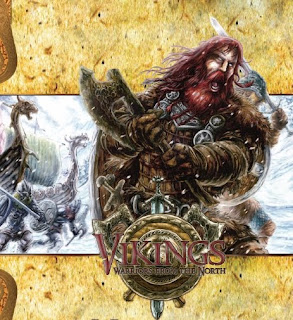Vikings have their proper code of conduct that, at many times, is considered more important than their proper laws. Frequently, a Viking can be pardoned or have his penalty commuted to banishment, if his reasons are honored. A man who demonstrates to have a deficient personality, though, will be marked through his whole life.
This code is basically defined by four main virtues: honesty, hospitality, courage and loyalty. Besides those, Vikings also admire cunning and luck. Although cunning is more of a vice than a virtue, the way it’s used or the results obtained from it wind up bringing reputation to the man who uses it. The true Viking hero has all these characteristics in abundance, besides being a deadly warrior, a sly poet, an enthusiast of partying and drinking and, sometimes, a deep connoisseur of magic.
Honesty: The word of a Viking, given in oath, contains the supreme truth. Once the word of a Viking is given it will be kept at any cost, even one’s own life. An oathbreaker has no friends.
However, in everyday life, some situations allow an oath to be broken. In the case of an oath demanded with cruel intentions or to bring harm to the one who gave his word, breaking the oath is allowed. However, if the man who gave his word insists in fulfilling the oath, it won’t be his honor to be affected, but the deceiver’s.
Another frequent case of allowed breaking of an oath happens when the word was given to a foreign enemy or to a Viking of an opposed clan. This is especially accepted when done through satire, cunning or, mainly, a heroic act.
Hospitality: For a Viking traveler it’s important to know that, in friendly territory, he’ll always have food, shelter and protection. Thus every good man has the obligation to treat a guest in the best way possible and to wait nothing else in response. The most popular satirical verse between Vikings tells about a stingy host.
Courage: It seems redundant to talk about Viking courage, mainly in battle. However it’s important not to mistake it for self-denial or disdain to one’s own life. A Viking values his own life and will not endanger himself for a cause that he knows to be lost. The unnecessary death is the death of a fool, but the death of a hero is the one that makes the difference.
An important aspect of courage is determination – the powerful desire to see something happen, no matter what is in the way. Once a Viking hero decides a course of action, nothing withholds him. To take a decision is to give his word to himself. A man without decision is not honest to himself and has no honor.
Loyalty: Loyalty commands the relation that exists between the individual and his group. The loyalty of a man belongs to his family, his jarl and his king (or althing), in this order. This order of priority can be modified by an oath of personal loyalty - for example, a huskalar will swear loyalty to his jarl, whose command will become his main priority.
The duty of a follower is to do anything that his jarl commands him to (this includes dying) and to place the interests of his jarl above everything else. The Jarl, from his part, is duty-bound to his followers and, in many cases, this is a more difficult role. He must behave in a good manner and be a just leader if he means to have men following him.
Cunning: This is the most curious rule of behavior. Using artifices that deceive an opponent is much appreciated, as they demonstrate the intelligence, wit and malice of the Viking people. However, this type of trick must be applied only against those opponents who prove undeserving of respect. The line between cunning and cowardice or disloyalty is narrow and not quite defined, and the reputation for cunning can be changed into notoriety for lie, deception and cowardice. To be smart is a risky move.
Luck: Without luck a man can be honest, hospitable, courageous, loyal and smart, without ever obtaining anything, and without earning reputation or fame. A man can be born rich and lose everything, but a man born with luck never goes hungry. Heroes who have luck are good men to follow.

No comments:
Post a Comment